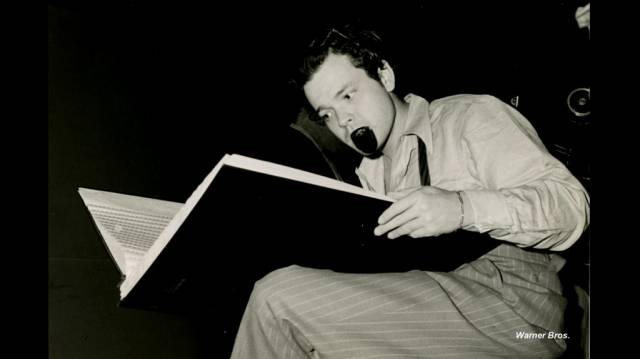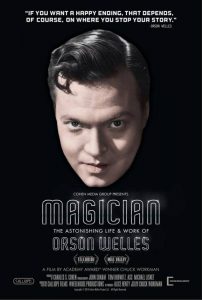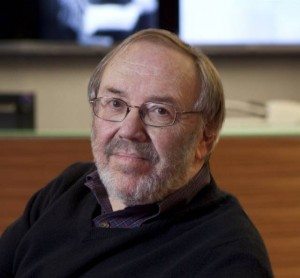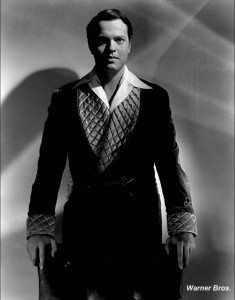
 While the name Chuck Workman might not ring a bell from the get-go, chances are you have seen his work without being aware of who made it. His 1986 Oscar winning short film, Precious Images, comprised of almost 500 half-second-long splices of some of the most iconic films in history, has become the epitome of what a love song to cinema should be about. Workman frequently contributes to the Academy Awards by making montages, including the “In Memoriam” section which year after year breaks our hearts, and has received multiple Emmy nominations for his work editing the Oscar telecast.
While the name Chuck Workman might not ring a bell from the get-go, chances are you have seen his work without being aware of who made it. His 1986 Oscar winning short film, Precious Images, comprised of almost 500 half-second-long splices of some of the most iconic films in history, has become the epitome of what a love song to cinema should be about. Workman frequently contributes to the Academy Awards by making montages, including the “In Memoriam” section which year after year breaks our hearts, and has received multiple Emmy nominations for his work editing the Oscar telecast.
A true cinema lover, Workman has made documentaries about the avant garde movement, Andy Warhol and in 2013 made an entire film asking the eternal question of What Is Cinema? an existential approach to an artform that he suggests has yet to reach its creative peak. Perhaps to remind us of the possibilities of groundbreaking cinema, this year he released Magician: The Astonishing Life and Work of Orson Welles, which chronicles the “boy wonder” from his days as a rebellious theater director to his days in Hollywood. Featuring rarely-seen clips of his unfinished work, as well as interviews with filmmakers like Steven Spielberg, Costa Gavras, Paul Mazurksy and Richard Linklater, Magician might very well be the most complete study of Welles’ career to be put on film.
We had the opportunity to talk to the Oscar-winning Workman, about his thoughts on the current state of cinema, Welles’ little-known talents and how he comes up with the structure for his oneiric Oscar montages.
 I have to confess I always get depressed when I remember those 30 minutes that were cut from The Magnificent Ambersons.
I have to confess I always get depressed when I remember those 30 minutes that were cut from The Magnificent Ambersons.
I know, can you imagine? Orson Welles apparently heard that the It’s All True stuff was found, and what happened is the head of post-production in Paramount called them up in the 80s and said “Orson we found your negative”, and he thought he meant Ambersons, which apparently was dumped in the Pacific Ocean. What they had was the Brazilian footage of It’s All True, so he was brokenhearted. Imagine that you put all this work into something, it wasn’t his fault, he was just 25, he had to go Rio, it was the war, Pearl Harbor had happened while he shot Ambersons, and they wanted him to be in Brazil to shoot carnival in March of the next year. So he had to finish shooting and then go to carnival, and yes he had a great time down there, but he was still working for what they called the “war effort”. And back in the States they tested the film, it didn’t do well, it was kind of morose, which it is despite its beauty, and audiences didn’t like this. They tested it with a comedy and it tested badly, the studio sees pictures of him in Rio having fun and they started re-cutting it. They tried to talk to him, to get notes from him, to show him what they could, but for the most part the movie was thought of as a commodity, movies were always a commodity, especially in 1942. So they asked themselves how to fix this movie, and everyone was raising their hands, Joseph Cotten, Robert Wise, Welles’ manager...they were writing new scenes and trying to please RKO and they created scenes Orson had nothing to do with. Back in those days they either took the negative and sold the silver, or they dumped it...and they dumped it.
So this was common practice? I always have the fantasy that the negative will show up someday and that the studio just hid it, so Orson wouldn’t try to put it back together and get in as much trouble as he did with Citizen Kane.
Oh maybe! Maybe someone who was the boss of that just said “get rid of this”. Who knows? But whatever it was, the negative will never be found. There are stills of everything and recreations that somebody did, which were all on the old Laserdisc of Ambersons and also in a book. So the film was gone, he was fired from It’s All True...and that was the end of his Hollywood career for the moment. Except he was such a huge celebrity, even before Citizen Kane, so he was able to use that as well as his skills to get acting jobs.
I like that in your documentary you stress the fact that Citizen Kane is so highly regarded, not for its screenplay - despite it being Welles’ only Oscar win - but because he pretty much used every single cinematic resource available in the era, to make the film into the ultimate guidebook of source in how to make a movie.
Yeah, it’s his style. Raymond Chandler said that stories go and the style stays, and I think that true. Movies have the same stories all the time, so it all depends on how you do them. It’s the style that delivers a message to the subconscious of the audience, not just the emotional aspect, but an artistic message. That’s the story of art. Why does Picasso go into cubism? Because he’s looking at things differently. So that’s what Orson was doing, but studios weren’t interested in that, it was all a ton of bullshit to them.
I read a book André Bazin wrote on Welles where he pointed out that you can listen to Citizen Kane without watching any of the images, and it works perfectly as a radioplay.
Did Bazin say that?
Yeah.
I’ve been walking around with that book and I haven’t read it. I read the Truffaut introduction to it, but never the actual book and I teach Bazin, I even made a film called What Is Cinema? But I didn’t hear this, it’s very interesting. Sound was very important to him, George Lucas said rightly that sound is 50% of a movie.

In What Is Cinema?, as well as your other films you inspire people to seek the films you talk about. You don’t take a snob approach to movies, unlike many scholars who think of film as something elitist.
In defense of them, of people like Bazin, they want you to see the film that they’re seeing and not just watch the story. In What Is Cinema? for example, you need to forget the story, Hoberman, who is a newspaper critic, a very good one, but not necessarily a scholar said the same thing, movies are about many things besides the story. But in Hollywood if you talk to anyone making a product they like to think of themselves as storytellers, but emotionally there’s just so much more going on, also in technique. This could be the ultimate artform, but I don’t know if it has...maybe Jean-Luc Godard, but I don’t know if film has had its Picasso, or James Joyce or Stravinsky, or Frank Lloyd Wright...someone who turns the tables and Welles was trying to do that. That means that films are still stuck in the rut of what they’ve been for one hundred years: a huge entertainment mechanism for most of the people on the planet, which is pretty good. But yet this is a vast artform.
Which is why I’ve always found it ironic that Welles won the Best Original Screenplay Oscar. Whenever they give awards for screenplays it’s obvious that these people aren’t rewarding the actual screenplay because not all of them read it. They’re just rewarding the film based on an original idea, or quotable lines and dialogues, or prestige, if someone takes a complex book and makes a good movie out of it, they reward them.
Well you can’t make rules based on Oscars, otherwise Braveheart would be the best movie of the year (laughs).
In What Is Cinema? you put a lot of attention on Kelly Reichardt.
Yeah, I showed clips of the films she did with Michelle Williams. Kelly was cutting Night Moves in Brooklyn so I went see her.
Do you think that filmmakers like Reichardt will become the next Welles?
Maybe not the next Welles, but certainly somebody very interesting. There are independent filmmakers that all they wanna do is go to Hollywood, I don’t think Kelly’s like that at all, I even asked her if she’d take a two million dollar check if someone asked her to direct something and she said “yeah, I’d take it” (laughs) but I don’t think that it would change her films. But look at people like Nolan, he made a great couple of films at the beginning of his career and now he’s “the Batman man”, and that’s generally the pattern that the really interesting filmmakers follow, but not people like Linklater and Wes Anderson.
Do you still try to find any artistic value in blockbusters?
I don’t know, I wasn’t a big auteur fan when I started, so I would have tried to do that, but I don’t think that way anymore. I think they’re basically entertainment, they’re fun...they’re like a mystery novel, there’s Chandler and Elmore Leonard, and hundreds that don’t make it. You’d need to make very interesting choices, whether in the casting or the cutting to make it work artistically, even something like Birdman feels wrong to me. There are moments in it that are too commercial, the whole stunt with making it seem like it was one shot is not there at all. It was interesting for a Hollywood film, but after a while you think, why bother?
Even if they don’t work necessarily, do you think that films like Birdman will inspire people to see something like Rope, which it was obviously emulating visually?
No, they won’t check out Rope (laughs) but they might seek Russian Ark, which really was done in one shot. They might check it out out of curiosity but you don’t even get that in Birdman, it just feels like a lot of long takes, which is something people like Angelopoulos did much better.
 You completely remove yourself from Magician. Why is that?
You completely remove yourself from Magician. Why is that?
I never put myself in the film, but I’m 100% in the film in a way, I’m trying to argue a particular point which is that we’ve seen documentaries about Welles which make it seem as if he hung himself after Citizen Kane. I talked to someone the other day who told me they didn’t know he’d done anything after Kane. Even in Magician there’s a moment when Welles says that a waiter came up to him and as if he’d ever made another movie. I was trying to show that in the film and you might not hear my voice, but believe me I’m interested in showing this. You look at his films and they just keep getting better and better, he’s learning new techniques, learning about editing, or how to direct himself, write better scripts...he understood editing in an Einseinsteinian way, but he also understood himself, so in Touch of Evil he made himself into this grotesque character that when he dies you still feel bad a little bit.
Why the title Magician?
I think the reinvention that he does made him a magician. There’s a place in L.A. called the Magic Castle and I was trying to shoot there, but in the end I felt it served as a metaphor for his work and how almost magically he got his movies done. He wasn’t swimming in the same stream all the others were.
One of the most surprising things in the documentary is when we hear him speaking Italian! I asked myself, was there anything this man couldn’t do?
I know! I have him speaking Spanish and French in an earlier cut of the film as well. His Italian wasn’t bad, but he spoke very good Spanish and French, he also spoke some German and some Slavic languages because his girlfriend was Croatian.
Did you find anything else about him that downright surprised you?
I found that he was rarely bitter, one of the critics wrote to me about that saying how they were glad this didn’t become some tragedy. He was always charming in a way, he was always trying to have fun. Everybody was scared of him, he would yell at people but no one said no to him. He would come up to you ask you if you wanted to be a grip on his film and you’d go, but then he would yell at you or something. So people used to hide behind the camera, but other than that he was mostly charming, even if he’d been beaten down a lot. So that was surprising to me, especially because this is a very difficult business and an artform, so you have to keep a positive spirit, which he did.
I grew up watching the work you did at the Oscars and your films like Precious Images which are so dreamlike. How do you put these sequences together?
I think by the time I’m putting them together I’m past that, where I don’t think, I’m just trying to put them together in the best way possible for whatever strange reason I have. Of course there’s something subconsciously going on where I know I want to go from A to B to C, but I’m not always sure. I don’t look into that. I once had a girl work for me who was studying semiotics and structural criticism and I remember walking past her desk into the cutting room and said “you know what I’m gonna do now, but I don’t” (laughs) because I’m sure I’m motivated by all those things the structuralists talk about, like dreaming. Dreams do affect this because of their disconnectedness...Bazin would not approve of dreams (laughs).
There’s also this element of you adding tiny jokes in your movies, that aren’t always easy to catch, like that Lawrence in Arabia moment in What Is Cinema?
Yes, someone watching that on a phone. I put that stuff in and hope somebody will get that. So thank you. I do it on purpose, I did it on Welles, I did more of those but people didn’t seem to get the joke.
Will we see those in a DVD in the future?
I don’t know, sometimes they’re gone. David Lynch doesn’t believe in showing you anything that wasn’t in the film.
Magician: The Astonishing Life and Work of Orson Welles opens in theaters on December 10.